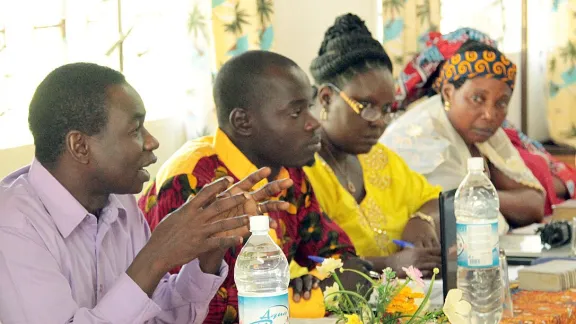
Participants in the LWF workshop at Ngaoundéré, Cameroon, included Rev. Mamadou T. Diouf (left), President of the Lutheran Church of Senegal. Photo: LWF/ David Adjia
LWF facilitates workshop for churches in West Africa
(LWI) – Church representatives from West Africa said training workshops provided by The Lutheran World Federation (LWF) on innovative management of human resources for diaconal work help them to strengthen relationships in the sub-region and develop competitive terms for their skilled personnel.
“The workshop served as a catalyst for strengthening the relationships between the francophone churches of the West African sub-region. It is an experience that should be widely shared,” said Rev. Mamadou T. Diouf, President of the Lutheran Church of Senegal (LCS). He was among 23 representatives of four LWF member churches in Cameroon, Central African Republic (CAR) and Senegal, taking part in an LWF-led workshop in Ngaoundéré, 10-15 October.
The Senegalese church is actively involved in interfaith initiatives that foster community development, in a country in which more than 90 percent of the population is Muslim. Its youth and women’s work includes assistance to orphans and other vulnerable members of society. “The workshop helped me understand what gender equality between men and women is about, and the need for good cooperation with our Muslim brothers and sisters,” added Coumba Faye, leader of the LCS Women’s Ministry.
Hospitals, schools, radio station
Representatives from the workshop host, Evangelical Lutheran Church of Cameroon (EELC), said its institutions provide not only much needed services but also create employment. Health work is carried out in three hospitals and 18 centers including one for ophthalmology, which employ 535 staff. In addition the church runs 31 schools—kindergartens, primary, secondary and one college—with 5,700 students and 191 teachers. This November, the EELC radio station Sawtu Linjiila (Radio Voice of the Gospel) will mark 60 years of broadcasting religious programs that also focus on education, health and other issues.
The workshop helped me understand what gender equality between men and women is about, and the need for good cooperation with our Muslim brothers and sisters.
The participants identified some of their common challenges as lack of skilled personnel, high staff turnover, aging infrastructure and cumulative unpaid wages and salaries. They noted that none of the churches runs agricultural projects in a sub-region where the majority of the population is rural, and living off poor yielding subsistence farming. Social and political contexts in the sub region include religious pluralism, civil strife and unrest, environmental degradation, poverty and poor political governance.
“This workshop has helped us to understand how as church leaders and diakonia coordinators we can better engage our professionals and volunteers in the context of growing needs and shrinking resources,” said diakonia officer Yibam Mansou, Church of the Lutheran Brethren of Cameroon.
Mansou said volunteers run most of the services provided by the church’s three health centers as the income generated is not sufficient to hire staff. The health, educational and economic empowerment projects benefit more than 5,000 people each year, he added.
Insecurity
In a country still recovering from the impact of internal political conflict, the diaconal work of the Evangelical Lutheran Church of CAR is often hampered by recurring insecurity, staff turnover, inadequate salary structure and lack of technical personnel. The church runs 22 village schools and special schools for Muslim girls. It has two health centres, a community project that facilitates access to clean water and improved sanitation, and rehabilitates run-down wells and other water sources. Its other rural development projects include activities to protect the environment and microcredit savings associations at village level.
Exchanging ideas
Abebe Yohannes Saketa, LWF program coordinator for Capacity for Diakonia and regional consultant Prof William Ogara conducted the training in Ngaoundéré.
“As a step in the direction of seeking innovative approaches some participants created a WhatsApp group for diaconal learning and exchange. It is encouraging to note that the group is already sharing some of the outcomes from the workshop,” Saketa said.
The workshop was in a series organized by the LWF Department for Mission and Development in Latin America and the Caribbean, Africa and Asia this year, bringing all together around 100 participants from 21 member churches.
David Adjia, director of the EELC Radio Sawtu Linjiila, contributed to this article.


